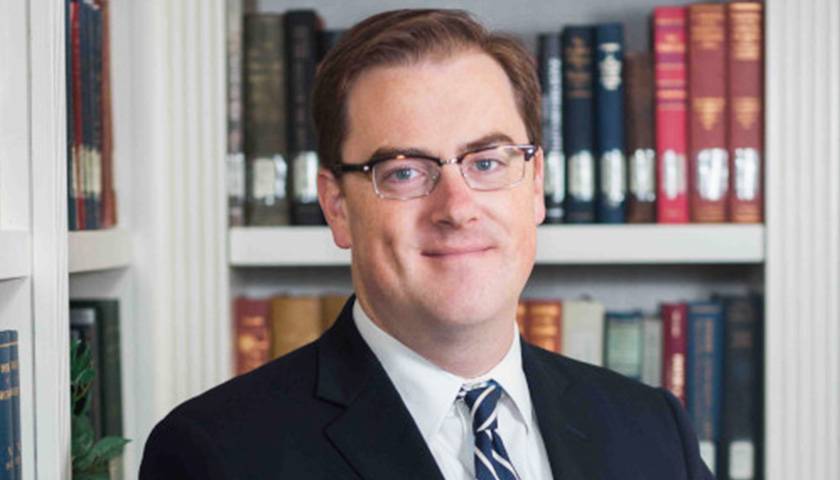SOMERS, Connecticut – Hillsdale College’s associate dean for its graduate school of government in Washington, DC, told attendees at an event Friday evening in Connecticut that while the enemies of religious liberty reject that which is divine in man, that concept is not “a Christian principle, per se,” but, in fact, “a rational principle.”
“In a certain sense, that can be summed up very simply, that we are actually children of God,” Dr. Matthew Mehan said at the College’s Blake Center for Faith and Freedom in Somers. “That is not a Christian principle, per se, although clearly it is one of the Christian principles. It’s actually a rational principle. And it’s actually a teaching of the philosophers and the poets both in ancient Greece and Rome.”
Mehan, whose talents range from scholarly papers in the realm of the humanities and politics, to authoring children’s books, was presenting on the topic of religious liberty at the Blake Center, a replica of Thomas Jefferson’s Monticello.
Pressing ahead with the concept that man’s divine nature is the “immortal soul,” Mehan asserted:
We are not merely a collection of cells and agitated amino acids from some soup. Something else is in us that is beyond material orders. And even the material order is something non-chaotic and actually something ordered by divine mind. So, in us, is divinity in its real sense, in that we have this, the breath of God, the spark of God. And again, I sound like I’m talking about Christian revelation, right? Religious belief. And, in one sense, I certainly am. But these are rational principles, known through natural reason and philosophy.
Mehan said that, when considering man’s “immortal soul,” death “becomes defined as the separation of the body from the soul, not the end of biological life, but the actual separation of the body and the soul.”
“That notion is that there’s something divine in us, there’s something unbreakable, something that, unlike a body, which can be severed and separated, and that’s broken, and divested of life,” he explained.
“So, what does that mean for us?” he asked. “That is one of the key tenets of understanding religious liberty, as something that you can have as a rational basis … for governments.”
During the Q&A following his talk, Mehan was asked about the current state of religious persecution in America, specifically whereby abortion and LGBTQ rights activists attempt to eradicate religious expression in the public square with the claim it violates the Establishment Clause of the Constitution.
Mehan responded such individuals and groups are embracing an idea “that you can just claim rights without a robust and profound and rich, textured understanding of human nature, and just sort of willy-nilly-like make claims to the right of abortion.”
He observed that Aristotle once said that “the distinct mark of a barbarian is the inability to make distinctions.”
“They have this idea that there’s no distinct difference between the right to life that an individual has, and the right to kill another life from the gate,” he asserted, adding:
There’s no different distinctions. There’s no concern about the nature of a human being … again, a rational argument that I think we should make, unapologetically. I don’t think you want to just make this argument. But I think it’s totally acceptable to say, okay, even on your terms, even on your terms, do you not understand that it’s a rational principle, that religious belief inculcates civic virtues of self-control, that bring order and peace. If you can’t see that, you don’t understand the history.
Mehan encourages defenders of religious liberty to debate those on the other side.
“And then you can have a fun argument that they don’t want to have,” he continued, noting that religious liberty defenders must not give up, particularly at this time with the strong presence of a “formal atheistic presentation in our city.”
“I think you need to be able to speak from faith,” he stated. “But you also need to speak from reason. And then you also need to speak from even their priors. Because it turns out it’s really nice. Bad reasoning falls in on itself, so you can grant their priors and still destroy their arguments.”
– – –
Susan Berry, PhD is national education editor at The Star News Network. Email tips to [email protected]
Photo “Matthew Mehan” by Hillsdale College.




